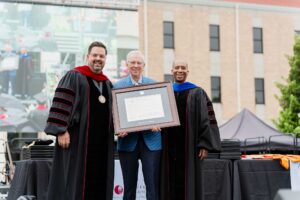
COCHRANE, Alberta, Canada (BP)–When Canadian Southern Baptists vote on a proposed restructuring of their 12-year-old convention, they must decide if the risks of defunding associational missionaries in order to give more money to church planting are worth it.
Leaders of a convention study committee and the convention staff believe they are. The proposed restructuring will be voted on at the annual meeting of the Canadian Convention of Southern Baptists at the end of June.
“Our report has risks inherent in it — any change has,” said study chairman Paul Johnson, pastor of Royal Heights Baptist Church, Delta, British Columbia.
“Our convention will need new ways to care for struggling churches. Our associations will face the challenge of designing a new leadership structure. Our pastors will need to work hard at building strong relationships with other pastors,” he said, noting, “But the potential is worth the risk.”
Johnson explained his committee’s decisions: “We asked ourselves, ‘How can we be obedient to the mission we have from Jesus to reach this generation of Canadians with the gospel? Is there any better way than by planting churches?’ We knew of none.”
Allen Schmidt, Canadian Southern Baptist executive director-treasurer, echoed the need for more church planting, noting 48 percent of the convention’s resources will go directly into church planting in Canada as a result of the restructuring. He pointed out this is a great challenge of the 120-church convention, which spans a distance greater than the United States; Canada is the second-largest country in the world.
“If we are going to reach our nation for Christ, we must plant more Bible-believing, evangelistic, disciple-making churches,” Schmidt said.
The current structure of seven associational missionaries in the country’s seven associations and three ethnic missionaries will be replaced by six church planter catalysts and two “total church life consultants,” one in Vancouver and one in Toronto.
All the new staff would work regionally with churches and associations, instead of being connected to one association. Schmidt said the convention does not plan to terminate anyone currently working for the convention, but rather give each person the option to work within the restructured convention. Currently four of the seven associational missionary positions are vacant. Associations can continue to have a full-time associational missionary if they budget increased funding for the position, beginning with 50 percent of the individual’s salary.
In addition to the elimination of associational positions, language work will cease to exist as a separate division, with the convention to relate to churches equally.
Also, a pastoral and evangelism consultant will be added to the denominational staff.
“This person will give us a higher emphasis on ministering to pastors and their families in the high-stress role of pastoring today,” Schmidt said.
The convention ordered the “program and structure review” study to be undertaken in its 10th anniversary meeting in 1995.
“With the planned restructuring of the Southern Baptist Convention, it was a crucial time to determine how we would do our work to be prepared to mesh with the restructured SBC,” Schmidt said.
Johnson added, “We felt it best to design our own strategy for the next stage of growth and get a clear vision of reaching Canada before we related to the North American Mission Board (a merger of the SBC Home Mission Board, Radio and Television Commission and Brotherhood Commission) and the International Mission Board (formerly Foreign Mission Board).”
When asked if the restructuring will make the Canadian convention better, Johnson acknowledged he could not promise that it would.
He related the example of Moses who, obeying the Lord’s assignment, produced a perfect replica of the tabernacle. However, the structure remained dormant, “until the Lord occupied it.”
Thus, he said, “No structural changes, no new phrases, guarantee success.”
So the real question is, “Is it possible for this report and its acceptance to make the Canadian Convention of Southern Baptists better?”
He qualified his answer: “If these recommendations sharpen our corporate vision, if the recommendations deepen our group passion for Christ’s kingdom, if these recommendations make us determined to evangelize this godless, hopeless generation, then the answer is, ‘Yes!'”














